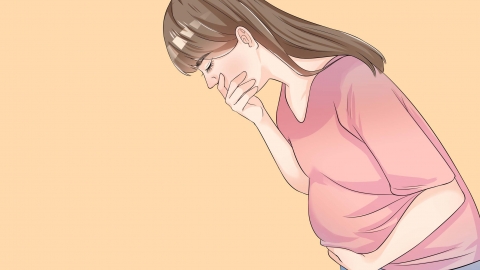What causes severe vomiting during pregnancy that won't stop, and what should I do?
In general, persistent and severe vomiting during pregnancy may be caused by a sudden rise in hormone levels, heightened sense of smell and taste, anxiety during pregnancy, gastritis related to pregnancy, or hyperemesis gravidarum. It is recommended to seek medical attention promptly, identify the underlying cause, and follow safe interventions under a doctor's guidance. The specific analysis is as follows:

1. Sudden rise in hormone levels: In early pregnancy, human chorionic gonadotropin (hCG) and estrogen levels increase sharply, stimulating the gastrointestinal tract and causing severe nausea and vomiting. Eating small, frequent meals and choosing light, easily digestible foods such as soda crackers and steamed buns can help prevent an empty or overly full stomach, thereby reducing gastrointestinal irritation.
2. Heightened sense of smell and taste: During pregnancy, the senses of smell and taste become more sensitive, leading to strong reactions to stimuli such as cooking fumes and unpleasant odors, which can trigger vomiting. Avoid exposure to irritating smells like kitchen smoke and perfume; ensure good ventilation while cooking, and consider wearing a mask to reduce odor inhalation.
3. Anxiety during pregnancy: Worry about fetal health or childbirth can lead to mental stress, worsening nausea and vomiting. Talking with family daily to relieve stress, listening to calming music before bedtime, and seeking professional psychological counseling when necessary can help maintain emotional stability.
4. Pregnancy-related gastritis: During pregnancy, gastric mucosa may become congested and swollen, and digestive function weakens, making severe vomiting after eating more likely. A soft, semi-liquid diet is recommended. Follow medical advice to take medications such as hydrotalcite chewable tablets, compound aluminum hydroxide tablets, and vitamin B6 tablets to protect the gastric lining.
5. Hyperemesis gravidarum: When nausea and vomiting exceed normal limits, leading to dehydration and electrolyte imbalances, urgent medical intervention is required. Immediate hospitalization for intravenous fluid therapy is needed to correct electrolyte disturbances. Antiemetic medications such as promethazine hydrochloride injection, thiamine (vitamin B1) injection, and metoclopramide injection should be administered as prescribed.
In daily life, ensure adequate sleep and avoid staying up late, which can worsen physical discomfort. Drink sufficient fluids—such as diluted salt water or lemon water—to prevent dehydration. Keep indoor air circulating well and create a comfortable environment to minimize triggers of nausea and support a smoother experience through early pregnancy.







